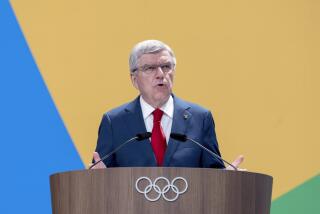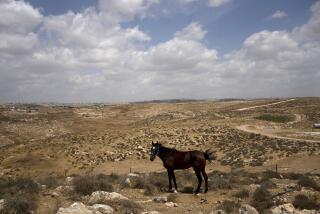Palestinians ponder next step in their statehood bid
After gaining momentum with their successful bid to join UNESCO, Palestinians now seem uncertain about their next move to win full membership in the United Nations and frustrated with their progress.
The Palestinians’ U.N. application was discussed Friday at the world body’s Security Council, but no vote was taken. Divisions among council members — including a veto threat from the U.S. — make the application almost certain to fail.
In recent days, Palestinian leaders have acknowledged privately that they don’t even have the nine votes needed to forward the application to the U.N. General Assembly, meaning the Obama administration may not have to use its veto.
Eight countries on the Security Council are believed to support the bid: China, Russia, Brazil, India, South Africa, Lebanon, Nigeria and Gabon. Those expected to abstain or vote no include Bosnia-Herzegovina, Britain, Colombia, France, Germany and Portugal. The U.S. has said it will vote no, arguing that Palestinians should instead achieve statehood by returning to the negotiating table with Israel.
The Palestinian Authority’s U.N. observer, Riyad Mansour, who once predicted Palestinians would garner the nine votes needed for full U.N. membership, told reporters Friday that eight votes was “nothing to be ashamed of.” His comments came after the Security Council’s admission committee, which had been reviewing the application, declared that its members were deadlocked.
France’s decision to abstain came as a blow to Palestinians since France had voted in favor of accepting “Palestine” as a UNESCO member last month.
Palestinian leaders previously said they would push for a council vote during Friday’s meeting, but later backed away once it became clear that they lacked the needed votes.
Their next move is unclear. After winning membership to UNESCO on Oct. 31, Palestinians vowed to pursue membership in more than a dozen other U.N. and international agencies. A few days later, they said they would suspend that effort and focus instead on full membership in the U.N., no matter how long it took.
Now Palestinian Authority Foreign Minister Riad Malki says they have changed their mind again.
“We may reconsider what was said last week regarding not applying for other U.N. agencies if our bid at the Security Council fails,” he said.
Another option is turning to the General Assembly, where Palestinians probably would win support for a resolution upgrading their status to a “nonmember state” from the current “nonmember entity.”
Some Palestinian officials say they want to continue focusing on the Security Council and force a vote, even if it fails. Others want to consult with the Arab League about the next step.
Analysts said Palestinian leaders lack a clear strategy, yet they are under pressure to keep the momentum going or risk a public backlash.
“This is going to be a painful defeat in the Security Council,” said Daniel Levy, co-director of the Middle East Task Force at think tank the New America Foundation. “The question is whether [Palestinian Authority President] Mahmoud Abbas can generate political traction … and seek solace in the idea of glorious defeat or whether this is going to be a major problem for Abbas for having miscalculated.”
Abbas, who is traveling in Tunisia, has not spoken publicly in recent days about where he hopes to take the campaign next.
Last week, Congress released a hold on some funds earmarked for the Palestinian Authority. Some lawmakers had threatened to halt U.S. funding for the authority in response to the U.N. membership campaign, but the lawmakers said they agreed to release the money at the request of the Obama administration, which warned that the collapse of the authority might embolden Palestinian extremists.
Next week, the so-called Mideast quartet, consisting of the United States, European Union, U.N. and Russia, plans to resume separate meetings with the Israelis and Palestinians, but chances of peace talks resuming remain slim.
Special correspondent Maher Abukhater in Ramallah, West Bank, contributed to this report.
More to Read
Sign up for Essential California
The most important California stories and recommendations in your inbox every morning.
You may occasionally receive promotional content from the Los Angeles Times.









